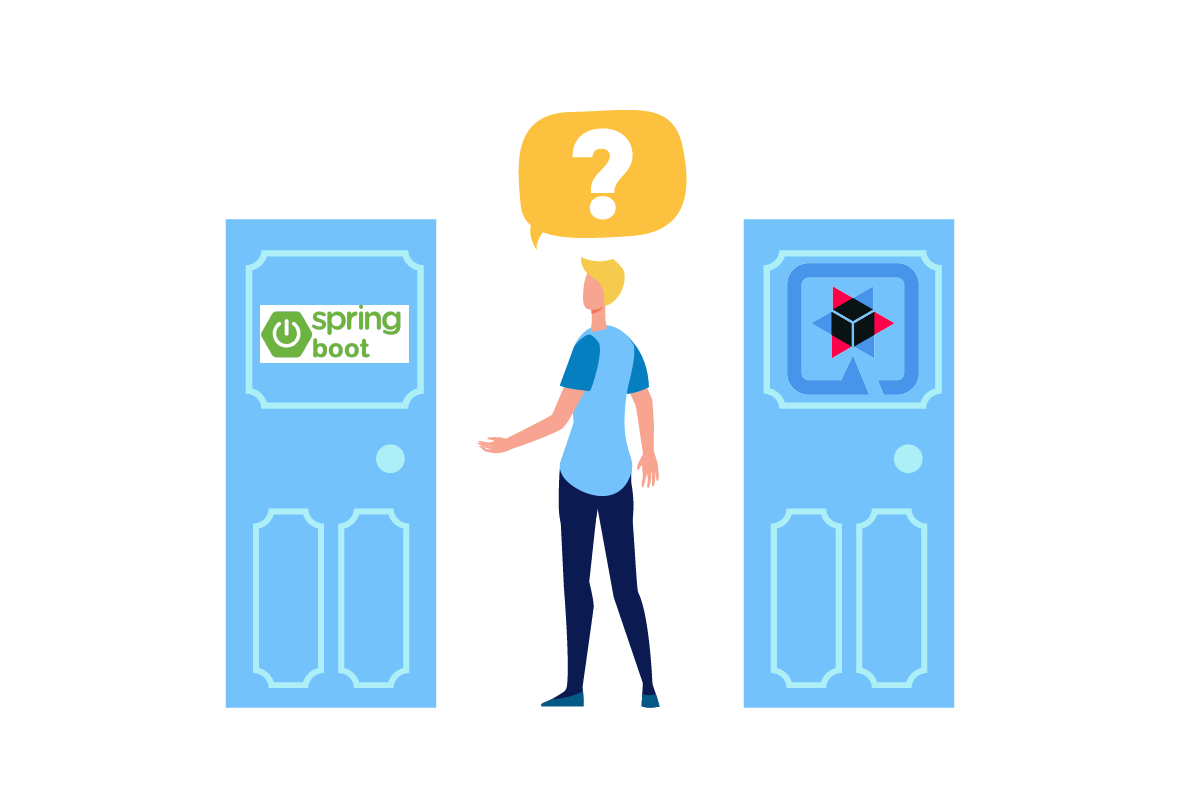The race for quantum dominance gets hotter. IBM, Google and Microsoft are pouring millions of dollars in the hopes of creating the first fully functional quantum computer that could be used for commercial use.
What is quantum computing and why has it become such a lucrative field for tech giants?
A quantum computer seemed like a pie in the sky until scientists from MIT university turned this dream into a masterpiece of computer science. In the late 1980s, this was a breakthrough that intrigued scientists’ minds and planted the seed of hope for a new IT revolution.
Almost half of a century later, quantum computing is no longer a mere fantasy. Google has recently made the headlines of all tech publications, claiming it finally achieved quantum supremacy, meaning its quantum computer can perform a task any traditional computer cannot and won’t probably accomplish.
Startups and enterprises worldwide are already using the power of quantum to conduct studies and carry out operations a traditional computer cannot handle. So, what’s next? What advancements will quantum bring to us in the upcoming years?
What is Quantum Computing?
Classical computers manipulate basic units of information (bits), which values are represented as binary 0 or 1 states. Quantum computers are also based on the primary ability to store and operate these attributes, yet with one difference ― they leverage quantum qubits (atomic nuclei or photons etc.) whose properties allow them to perform complex computations.
Similar to bits in traditional computers, quantum bits can also be put to one of two the system’s possible states, e.g. an atomic nucleus spinning up or down. However, in the quantum world, the qubit can be in superposition. It is a phenomenon that enables qubits to be in proportions of both conditions at once. The definition of qubit superposition has turned nature science concepts upside down.
Until the qubit is observed, it is in the superposition of 0 and 1, and we cannot predict the value it will take. But the moment the quantum bit is measured, it stops in one of the states. As a result, the time required to procedure a data set is reduced significantly.
Google has recently announced that a task that usually takes 10 years by a Boolean computer can be completed in 3 seconds when a quantum computer enters the game.
Quantum Entanglement
Another impressive property of qubits is entanglement. So what is quantum entanglement? The essence of this quantum mechanical phenomenon lies in the close connection that makes each of the qubits instantly respond to a modification in the condition of the other, no matter how far away they are from each other. By taking the measurements of just one entangled quantum bit, you can immediately determine the attributes of its partners without any complex computations.
Finally, due to phase quantum states can be subject to interference, which can be understood in the same way to wave interference. The waves’ amplitudes are added when they are in phase, otherwise ― cancel. The above properties are used in quantum computing to control the state of qubits.
Quantum Computing and Classical Physics
In the past, science questioned religious teachings and beliefs, now quantum physics is contradicting concepts of classical physics. The difference is that the modern world welcomes new breakthroughs and scientists won’t be persecuted for their heretical ideas.
Let’s imagine a situation of having two bombs with identical fuses. According to rules of classical physics, they would explode at the same time. However, according to the laws of quantum physics, two identical radioactive atoms will explode at different times although they are indistinguishable. Quantum elements share a set of features that seem to be the verge of common sense like teleportation, time travel or an ability to be at two places simultaneously.
Although most theories of classical physics collapse when applied to extremely small objects like atoms and subatomic particles or to objects moving near the speed of light, it doesn’t mean they are completely wrong. Most scientists and researchers believe that classical physics is derived from quantum physics.
As we learn more about the world’s structure and its laws, scientists make more discoveries which speed up technological progress. By taking advantage of the unconventional behavior of quantum particles in providing computing power, humanity can unlock new capabilities of quantum computing which cannot be reached by traditional computers.
With such impressive capabilities, the future of quantum computing looks promising.
The Limitations of Traditional Computing
When it comes to quantum computing, many question whether such technology is actually required for commercial use. While scientists claim quantum computers have unique capabilities that cannot be compared with any other technology, others believe that almost all issues can be resolved with popular techs.
A conventional computer chip size is around ~14 nm, but when it approaches ~10 nm, electrons may just ‘teleport’ to the other side of an obstacle via Quantum Tunneling, which is one of the quantum mechanical phenomena.
In other words, humans have reached a certain chip size, decreasing which will lead to the fact that the principles of classical physics will no longer be followed. It means that its capacity will be limited as well. In addition, according to Adam’s law, traditional computing does computations linearly when the ability of parallelization of calculations is also limited.
The computation power of classical computers is finite. In most cases, these limitations do not hinder us from performing mundane operations. But when it comes to solving complex problems and challenges that lie above a definite size and complexity level, traditional computers will not won’t help deal with these tasks.
Healthcare, pharmaceutical industry, manufacturing, and other fields will be able to use the power of quantum computers in performing complex calculations in a blink of an eye.
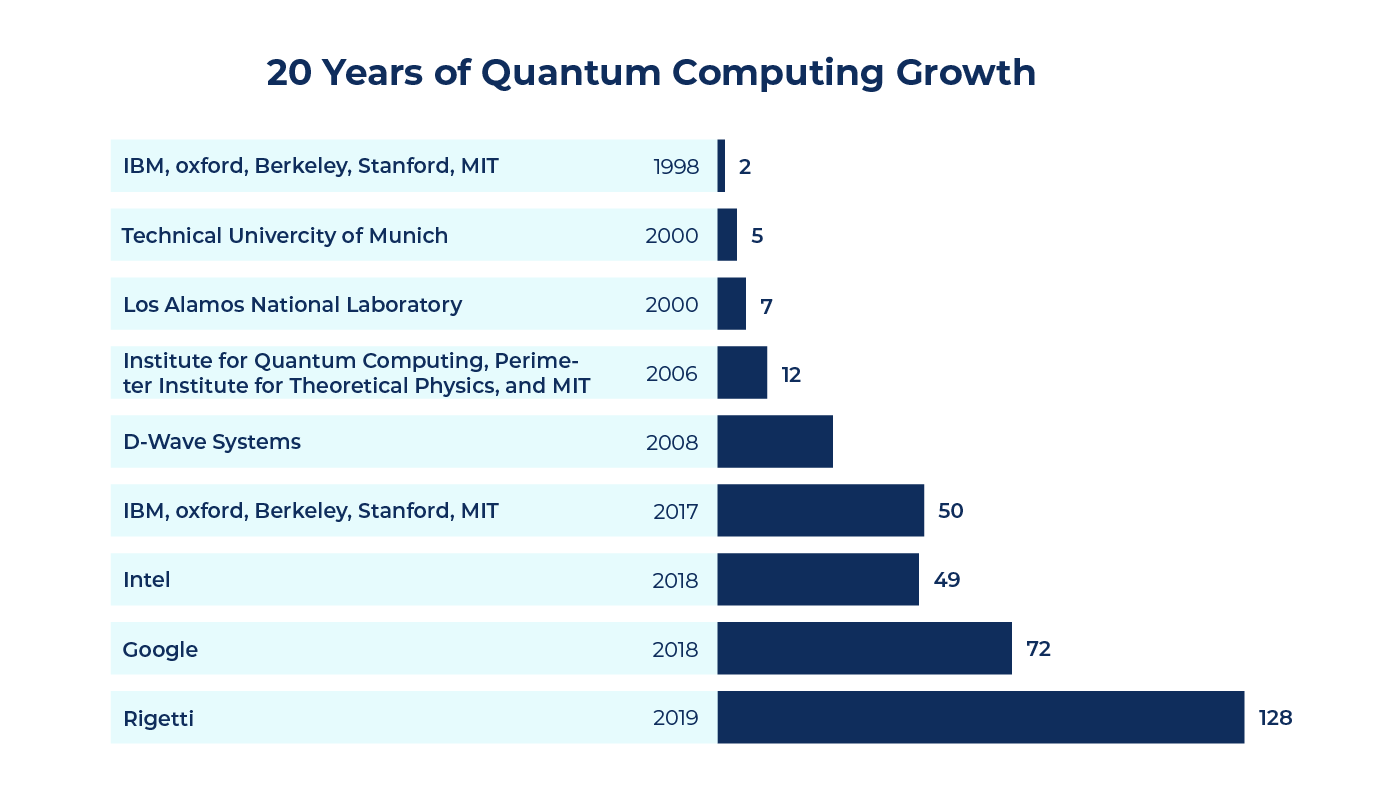
Quantum Сomputing for Business
Albeit quantum competitors are far from being perfect, we can find numerous use cases in finance (28%), global energy and materials (16%), pharmaceuticals and medical products (9%). Besides listed industries, quantum computing can also be greatly applied in businesses in various ways. For example cryptography, data analytics, forecasting, pattern matching and others.
Due to its exponential speed, quantum computing can simplify data protection and enhance security. But to set new security standards in the industry, quantum computers need to master a lot more qubits (around 20 million of them) for encrypting than they have right now (by September 2020 the largest IBM’s quantum computer contains 65 qubits).
Quantum-powered decision-making will allow businesses to make better decisions, and as a result, to increase their revenue and to reduce the amount of expended resources they may put in less effective strategies. A quantum operation matrix can be constructed to analyze a problem with multiple inputs.
Promises
Quantum computing is expected to turn modern cryptography upside down. It might help governments mitigate issues of data leakages, disclosure and sharing confidential information with third parties. Quantum cryptography might also be used to secure cloud information and distribution of nuclear authentication codes.
While the media creates a real buzz around the quantum computer’s ability to decrypt any information, scientists prefer to look at the bright side of things. Although quantum algorithms that could easily ‘crack’ security mechanisms indeed exist, the ability to create such a powerful quantum computer is still far beyond modern capabilities of research institutes.
Perhaps the most important and promising application is quantum simulation. When developing new complex systems, materials or medicine, it would be beneficial to calculate their properties.
However, calculating such sophisticated systems will require substantial computational power so that only quantum computers can handle this task. More controlled quantum systems can be used at the research stage to predict the effectiveness of new drugs, which eliminated the need to synthesize a test product.
“Quantum simulators can be thought of as specialised kitchen equipment that is exceptionally good at producing one type of food ― a perfectly cooked toast, for example.”
Lincoln Carr, The Colorado School of Mines
Quantum simulators may reduce the time of drug production to several days or even hours. It will also change the whole drug development process, eliminating the need to test new products on living species.
Interesting Facts
A decrease in the temperature of a heated body is equal to a decrease in the speed of movement of its atoms, and their “stop” will mean that the body no longer radiates thermal energy, being in a state of complete thermodynamic rest. This will be the temperature of absolute zero (0 Kelvin), unattainable in practice. In order to measure particles they must be in a stationary phase. In other words, quantum computing requires an environment with temperature close to absolute zero (−273,15 °C or −459,67 °F).
Many quantum computing technologies operate at around 0.1 K traditionally refrigerating qubits with two different types of helium isotopes. This process is very expensive and hard to achieve. That’s why physicists from the University of New South Wales in Australia have developed quantum technology that performs a single qubit operation at 1.5 K. If the technique is applied to quantum computers, it will not only reduce the cost and size of machines, but also open up opportunities for integration with existing technologies and scaling up.
According to Google’s statement, the top supercomputers can compute everything that a quantum computer with 5-20 qubits can calculate. In October, 2019 their scientists claimed to reach ‘quantum supremacy’. Google’s 54-qubits processor could perform a calculation in 200 seconds, whereas supermachines would calculate 10,000 years. It was the first experimental evidence quantum acceleration is not science fiction.
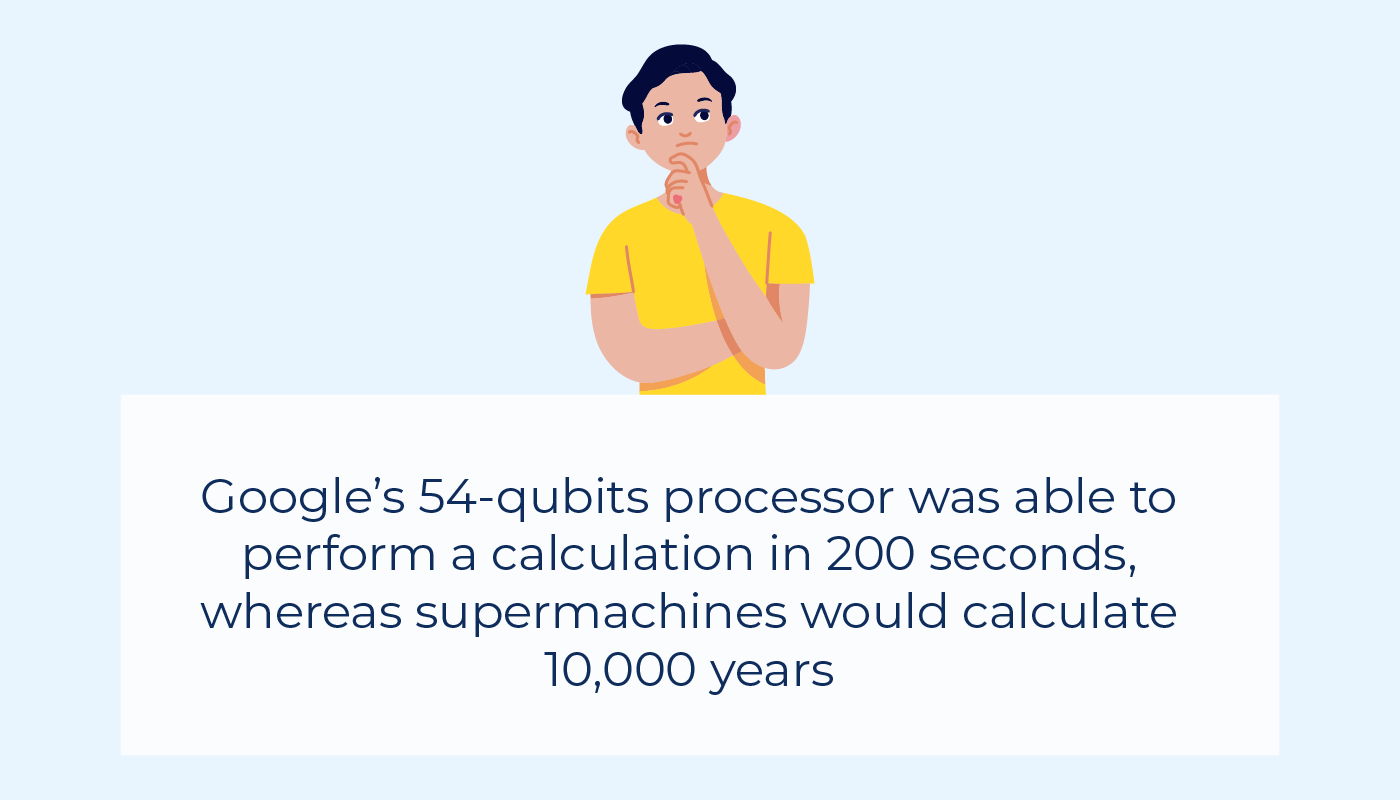
Business Applications of Quantum Computing
Quantum computing applications have a great potential to influence today’s business world. As already mentioned above, the finance and insurance industries benefit a lot from the technology. Businesses may rely on quantum computing in the energy sector by optimizing current network structure and predicting usage.
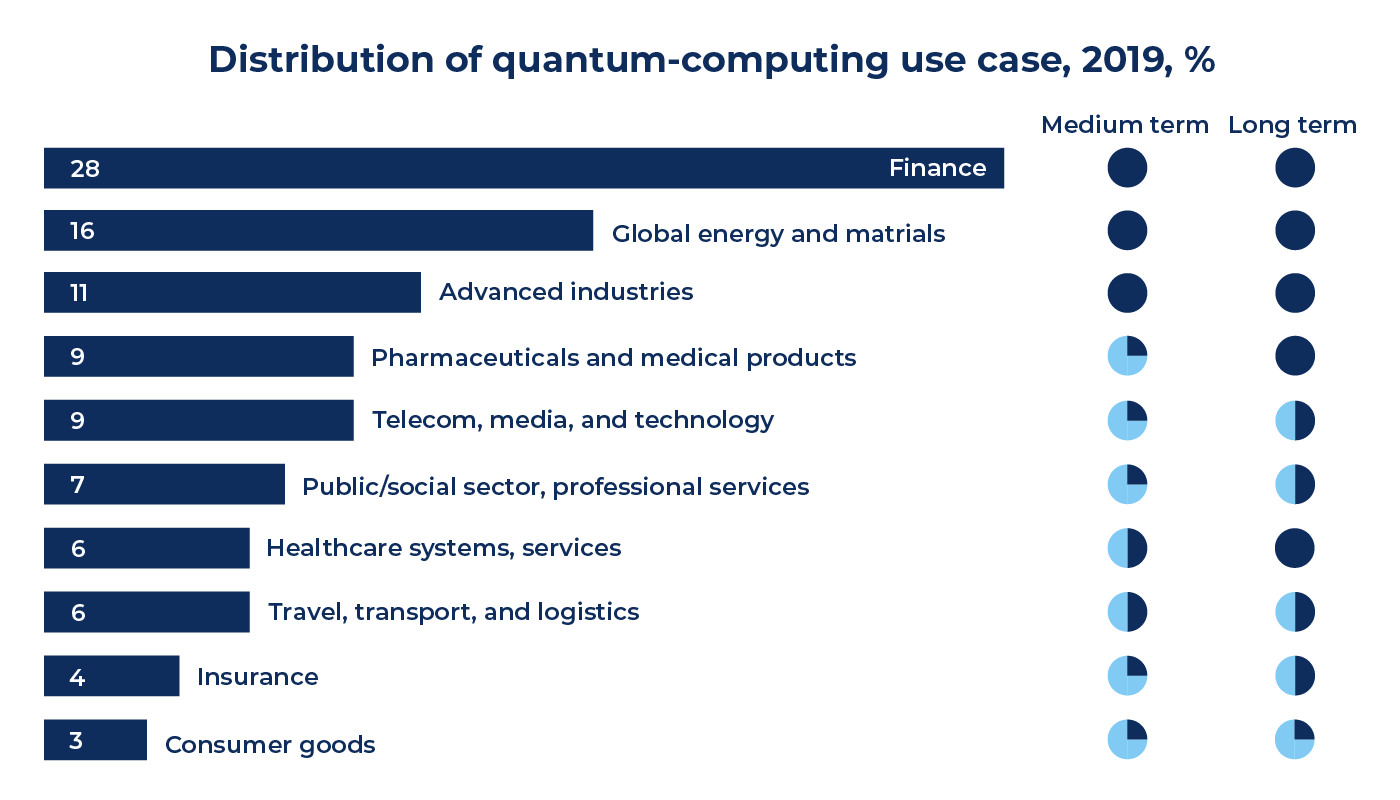
Quantum computing can be beneficial for the materials industry, like creating better chips or network architecture. Bosch and Honeywell have been exploring and have started to implement it in this vertical.
Automotive and aerospace will be one of the primary pools for quantum computing in the next five years. McKinsey estimated $2 billion $3 billion economic impacts by the next decade. Because of such a tempting offer, Volkswagen, Ford, NASA , and Lockheed Martin are all entering the field. Even though the largest enterprises were established, there are still a lot of smaller ventures, and not to mention start-ups, that are working in quantum computing.
Quantum Computing For Commercial Sector
Since the first quantum computer saw the world, there have been debates around who will find the application of this innovative tech for mass use. And almost 50 years later, PsiQuantum claims it will produce the first commercial quantum computer that can be put to mass production.
PsiQuantum has been silent about its venture until fairly recently. But with a board of leading UK scientists and the support of Silicon Valley investors, this silence has been deafening. Headed by Jeremy O’Brien, one of the leading scientists in this field, the company aims to build silicon photonic quantum computers, which will be able to beat conventional computers in a wide range of tasks.
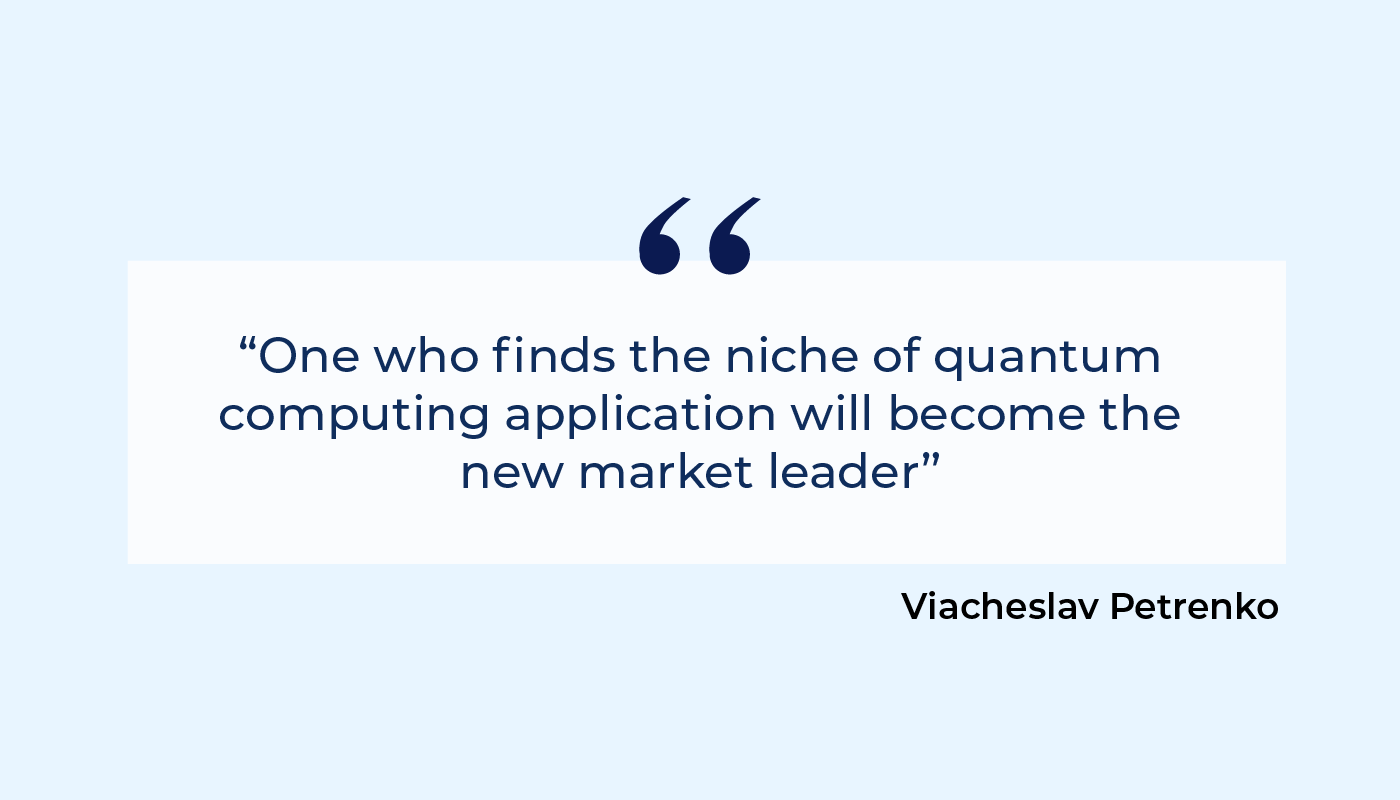
The company is going to apply Quantum Computing as a Service model, meaning that anyone will be able to access their device through the Internet. In such a way, founders want to make quantum computing more accessible to a broader audience, accelerating the adoption of new technologies among businesses and consumers.
To wrap it up
The probability of replacing conventional computing with quantum one will not come true, at least in the nearest future, because it was created for the purpose of solving complex computations that are unattainable by classical methods. It will speed up and make data analysis, medical researches, weather forecasting and other capacity intensive application areas more accurate. As a result, it will accelerate or even cause breakthroughs in these industries that definitely will greatly affect the world. That’s why the race in evolving quantum computing is still on.

